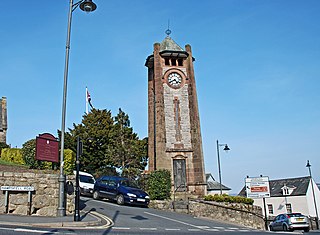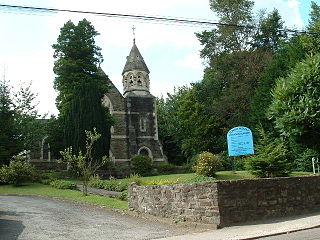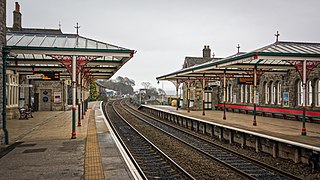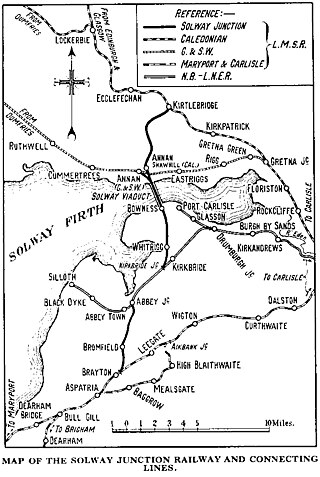Career
Brogden was born in Manchester on 3 November 1825, the second son of John Brogden (1798 – 1869) and educated at Blackburn, New College Manchester and King's College London, where he read mathematics. He married Anne Garstang on 6 September 1848 at Manchester Cathedral. He joined his father's contracting business, John Brogden and Sons, in 1846. He had intended to join the Bar but was persuaded to support his father instead. Among his first work for the firm was the supervision of contracts for the Manchester, South Junction and Altrincham Railway, the Ashton Branch of the Manchester and Birmingham Railway and the East Lancashire Railway. [1]
In 1850 Brogdens took a lease of the South Staffordshire Line jointly with John McClean and Alexander managed this for about six years. [1] During the building of the Ulverston and Lancaster Railway, Alexander supervised for the firm while James Brunlees was the Engineer. Alexander Brogden was the first chairman of the Solway Junction Railway, again with James Brunlees as the Engineer. [2]
With the sudden death of his elder brother John in 1855 [3] and the increasing age of his father, it can be assumed that he gradually took control of the business in the late 1850s [1] and assumed full control on his father's death in 1869. During the 1860s he and his wife resided at Holme Island, Grange-over-Sands, This is now in Cumbria but was then in North Lancashire. [4]
The Brogden family had a majority holding in the Ulverston Mining Co. in 1857. Alexander became the sole lessee in 1872. [5]
Brogden unsuccessfully contested Great Yarmouth as a Liberal in July 1865, but was elected as the first member for Wednesbury in December 1868 and represented that constituency for 18 years. [6]
In 1878 Brogden paid for the organ of West Bromwich Town Hall. [7]
In 1881 it was claimed that, when Parliament was not in session, he might be found in the space of 10 days in: Ulverston, Westminster, Cardiff, Paris, Holland and St Petersburg. [1]
Alexander Brogden's liquidation was announced in the London Gazette on 11 January 1884. This was owing to the failure of John Brogden and Sons. The Gazette entry gives many addresses: Queen Anne's Gate and Victoria Chambers, Westminster; Aberdare; Tondu; Meathop, Westmorland; Frampton Cotterell, Gloucestershire; The Hague; Cross Street, Manchester; 46 Dulwich Road, Herne Hill; Ulverstone; Grange-over-Sands; and Wellington, New Zealand. He subsequently chose not to contest his parliamentary seat at the 1885 general election.
Alexander Brogden died at 88 Lansdown Road, Croydon on 26 November 1892 at the age of 67. The Times records that he had been ailing. He was sitting by the fire and accidentally fell against the grate while attempting to stir the fire, receiving severe burns. He left a widow and a married daughter. Alexander Brogden and his wife also had a son, James Garstang Brogden, who died before his father. He was born in 1850 and died in 1885. [4] [6] . [8]

Grange-over-Sands is a town and civil parish located on the north side of Morecambe Bay in Cumbria, England, a few miles south of the Lake District National Park. In the 2001 census the parish had a population of 4,042, increasing at the 2011 census to 4,114. Historically part of Lancashire, the town was created as an urban district in 1894. Since the 1974 local government re-organisation, it has been of the South Lakeland district of Cumbria, though it remains part of the Duchy of Lancaster.

The Furness Railway (Furness) was a railway company operating in the Furness area of Lancashire in North West England.

Tondu is a village in Bridgend County Borough, Wales, located about 3 miles (4.8 km) north of the town of Bridgend, in the community of Ynysawdre.

The Furness line is a British railway between Barrow-in-Furness and Lancaster, joining the West Coast Main Line at Carnforth. A predominantly passenger line, it serves various towns along the Furness coast, including Barrow-in-Furness, Ulverston and Grange-over-Sands. It runs through Cumbria and Lancashire.

Grange-over-Sands is a railway station on the Furness Line, which runs between Barrow-in-Furness and Lancaster. The station, situated 15+1⁄2 miles (25 km) north-west of Lancaster, serves the town of Grange-over-Sands in Cumbria. It is owned by Network Rail and managed by Northern Trains.

Kents Bank is a small village in Cumbria, England, so named for its proximity to the River Kent estuary. Part of the historic County Palatine of Lancashire, it is located 2 miles (3.2 km) south-west of Grange-over-Sands.
The Ulverstone [sic] and Lancaster Railway Company was short-lived as a business but the line that it built is still in daily use. The line runs from Lindal-in-Furness to Carnforth where it joins what was then the Lancaster and Carlisle Railway. The intermediate stations are: Cark and Cartmel, Kents Bank, Grange-over-Sands, Arnside and Silverdale.

Sir James Brunlees FRSE MICE was a Scottish civil engineer. He was President of the Institution of Civil Engineers for 1882-3.
Wednesbury was a borough constituency in England's Black Country which returned one Member of Parliament (MP) to the House of Commons of the Parliament of the United Kingdom from 1868 until it was abolished for the February 1974 general election.

Wood Green railway station was a railway station that opened on the Grand Junction Railway in 1837. It served the Wood Green area of Wednesbury and Walsall. It closed in 1941. It was located near to where junction 9 of the M6 motorway has been located since the late 1960s.
John Brogden and Sons was a firm of Railway Contractors, Iron and Coal Miners and Iron Smelters operating, initially as a general contractor, from roughly 1828 until its bankruptcy in 1880.

John Brogden was a railway industrialist. He formed the company John Brogden and Sons with four of his five sons.
John Brogden Junior was the eldest son of John Brogden (1798–1869). He was born in Manchester in 1823. He was educated at the academy in Blackburn and then studied chemistry in Manchester. He joined his father’s business in 1846 and was closely involved with all the work. He appears to have taken a particular interest in the coal and iron mining and in the Ulverston and Lancaster Railway. He joined the Institution of Civil Engineers as an Associate in 1852 and was also a fellow of the Geological Society and a Member of the British Association.

The Solway Junction Railway was built by an independent railway company to shorten the route from ironstone mines in Cumberland to ironworks in Lanarkshire and Ayrshire.

The Mont Cenis Pass Railway operated from 1868 to 1871 during the construction of the Fréjus Rail Tunnel through the Alps between southeast France and northwest Italy. It was designed by John Barraclough Fell and his three-rail design was used on some other mountain railways. The railway was 77 kilometres long, with a gauge of 1,100 mm. The height at the summit was 2,283 metres (7,490 ft) and the maximum gradient was 9 per cent. It was used to transport English mail to India as part of the 1,400-mile (2,300 km) All Red Route.

Sir Francis Henry Evans, 1st Baronet, was a British civil engineer, businessman and Liberal Party politician.
Henry Brogden was born in Manchester, the third son of John Brogden. He was educated at King's College, London and spent a year at the locomotive works of George Stephenson, Newcastle-on-Tyne. He enjoyed engineering shop work and kept a very complete workshop at home. When he was old enough he became a partner in his father’s firm John Brogden and Sons. He played a full part in the direction of their many contracts and business interests. However whereas his elder brother Alexander Brogden seems to have been a very outgoing man, was elected as an MP and led the firm into many ventures, lawsuits and eventually into bankruptcy, Henry comes across as quieter, more studious and perhaps more careful. He is hard to find in literature.
Events from the year 1816 in Scotland.
This page is based on this
Wikipedia article Text is available under the
CC BY-SA 4.0 license; additional terms may apply.
Images, videos and audio are available under their respective licenses.












